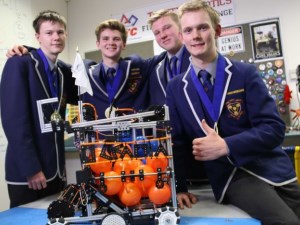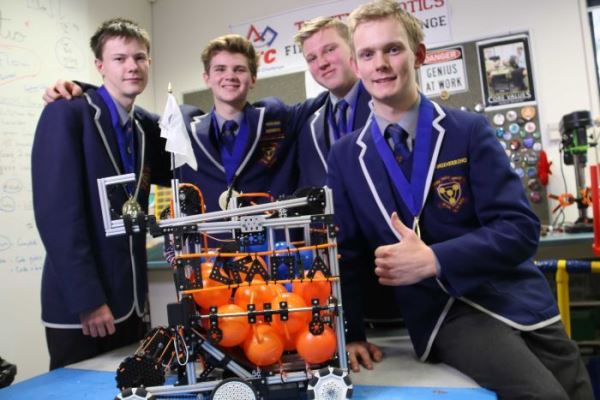A team of South Australian high school students have been crowned the world's best robot builders at the inaugural FIRST Global competition in the US.
The event, dubbed the "robotic Olympics," featured nearly 1,000 high school students from 157 different countries to battle it out in Washington DC.
But it was the group of Year 11 students from Trinity College in Adelaide who emerged victorious.
Team captain Luke Voigt said the experience left him lost for words.
"It just felt like, I don't know it's hard to explain, it was definitely a huge honour," he told the ABC.
The students spent one school term building a robot from scratch only using parts from a special kit sent to all of the competing teams.
"In other competitions you're allowed to use rubber bands for example but in this one you're not allowed to use anything – even drawing in markers on the robot you're now allowed to do," Luke said.
"Our main priority was to make a fast robot, having two motors on each side of the robot, so that we could be fast but also strong."
Real-life problem to solve
The robot had to navigate a fake river and pick up blue or red balls, automatically working out what colour they were and separating them.
The balls represented clean water particles and contaminants, which had to be removed to make it safe to drink.
Sue O'Malley, a teacher from Trinity College who coached the boys, said the competition featured a real-life problem for them to solve.
"They take on one of the grand engineering challenges of the world," she said.
"There's 14 of them and this year they focused on clean water for everyone."
Much of the team’s success was attributed to programmer Nathan Axford.
Designs and tips posted online
"It was a big challenge, I hadn't really done anything with programming robotics before and soon as I came into the competition it was like, 'oh okay I've got to learn everything now'," Nathan told ABC News.
Luke's dad, a software engineer, gave the team a few handy hints.
All the students' designs and tips were posted online to share with other teams from around the world also working on the challenge.
While that may sound strange in a competition setting, the overall winner in Washington had to have the best robot, game play and have helped others along the way.
"We had robots, but the robots were there as a vehicle to build the students and get the students collaborating," Ms O'Malley said.
"(Winning the event) meant they were the most helpful to all of the other teams and they were the absolute role models, so we were just overjoyed."
The South Australian team now has its sights set on the national championships in Sydney later this year.


